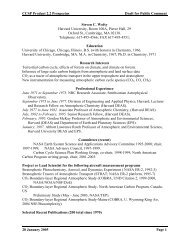Decision support experiments and evaluations using seasonal to ...
Decision support experiments and evaluations using seasonal to ...
Decision support experiments and evaluations using seasonal to ...
You also want an ePaper? Increase the reach of your titles
YUMPU automatically turns print PDFs into web optimized ePapers that Google loves.
Study or Experiment Chapter<br />
Regional Integrated Science<br />
<strong>and</strong> Assessment Teams<br />
(RISAs)—An Opportunity<br />
for Boundary Spanning, <strong>and</strong><br />
a Challenge<br />
Leadership in the<br />
California Department of<br />
Water Resources (CDWR)<br />
Section 4.3.2<br />
4, Case Study A<br />
<strong>Decision</strong>-Support Experiments <strong>and</strong> Evaluations <strong>using</strong> Seasonal <strong>to</strong><br />
Interannual Forecasts <strong>and</strong> Observational Data: A Focus on Water Resources<br />
Type of <strong>Decision</strong><br />
Support Information<br />
Needed, Used or<br />
Delivered<br />
The eight RISA teams<br />
that are sponsored by<br />
NOAA represent a new<br />
collaborative paradigm in<br />
which decision makers are<br />
actively involved in developing<br />
research agendas. RISAs<br />
explicitly seek <strong>to</strong> work at<br />
the boundary of science <strong>and</strong><br />
decision making.<br />
Drought in the Colorado<br />
River Basin <strong>and</strong> negotiations<br />
over shortage <strong>and</strong> surplus<br />
guidelines prompted water<br />
resources managers <strong>to</strong> use<br />
climate data in plans <strong>and</strong><br />
reservoir forecast models.<br />
Following a 2005 workshop<br />
on paleohydrologic data use<br />
in resource management,<br />
RISA <strong>and</strong> CDWR scientists<br />
developed ties <strong>to</strong> improve<br />
the usefulness of hydroclimatic<br />
science in water<br />
management.<br />
Most Successful<br />
Feature(s) or Lesson(s)<br />
Learned from Case Study<br />
RISA teams facilitate engagement<br />
with stakeholders<br />
<strong>and</strong> design climate-related<br />
decision-<strong>support</strong> <strong>to</strong>ols for<br />
water managers through <strong>using</strong>:<br />
(1) a robust “stakeholderdriven<br />
research” approach<br />
foc<strong>using</strong> on both the supply<br />
(i.e., information development)<br />
<strong>and</strong> dem<strong>and</strong> side (i.e.,<br />
the user <strong>and</strong> her/his needs);<br />
(2) an “information broker”<br />
approach, both producing<br />
new scientific information<br />
themselves <strong>and</strong> providing a<br />
conduit for new <strong>and</strong> old information<br />
<strong>and</strong> facilitating the<br />
development of information<br />
networks; (3) a “participant/<br />
advocacy” or “problembased”<br />
approach, involving a<br />
focus on a particular problem<br />
or issue <strong>and</strong> engaging directly<br />
in solving it; <strong>and</strong> (4) a “basic<br />
research” approach where<br />
researchers recognize gaps<br />
in the key knowledge needed<br />
in the production of context<br />
sensitive, policy-relevant<br />
information.<br />
CDWR asked the NAS <strong>to</strong><br />
convene a panel <strong>to</strong> clarify<br />
scientific underst<strong>and</strong>ing of<br />
Colorado River Basin clima<strong>to</strong>logy<br />
<strong>and</strong> hydrology, past<br />
variations, projections for the<br />
future, <strong>and</strong> impacts on water<br />
resources. NAS issued the<br />
report in 2007; a new Memor<strong>and</strong>um<br />
of Agreement now<br />
exists <strong>to</strong> improve cooperation<br />
with RISAs <strong>and</strong> research<br />
labora<strong>to</strong>ries.<br />
25




